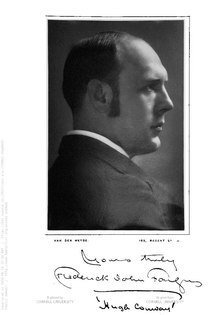
Hugh Conway, the pen name of Frederick John Fargus (26 December 1847 – 15 May 1885), was an English novelist born in Bristol, the son of an auctioneer. He had success with his fiction in the early 1880s.

Hugh Conway, the pen name of Frederick John Fargus (26 December 1847 – 15 May 1885), was an English novelist born in Bristol, the son of an auctioneer. He had success with his fiction in the early 1880s.
Fargus was intended for his father's business, but at the age of 13 joined a Mersey school ship Conway lent by the Admiralty for training merchant navy officers. In deference to his father's wishes, however, he returned to Bristol, where he was articled to a firm of accountants until his father's death in 1868, when he took over the family auctioneering business.[1] On 26 August 1871 married Amy Spark, daughter of a Bristol alderman. They had three sons and a daughter.[2] One son, Archibald, became a first-class cricketer, scholar and clergyman.[3]
While a clerk, Fargus had written words for various songs, adopting the pen name Hugh Conway in memory of his training-ship days.James Williams Arrowsmith, a Bristol printer and publisher, took an interest, and Fargus's first short story appeared in Arrowsmith's Miscellany.[1] In 1883 Fargus published through Arrowsmith his first novella, Called Back, an early thriller that sold over 350,000 copies in four years. One admirer of the book was the American poet Emily Dickinson. A stage version of it appeared in London in 1884, when Fargus published another story, Dark Days.[1]
Ordered to the Riviera for his health, Fargus caught typhoid fever, died in Monte Carlo[1] and was buried in Nice. Several other books of his appeared posthumously, notably A Family Affair,[1] which was serialized in the English Illustrated Magazine in 1884–1885 and first published in volume form in 1885.[4][5]
Long after his death, one of his novels was filmed as The Last Rose of Summer (1920).